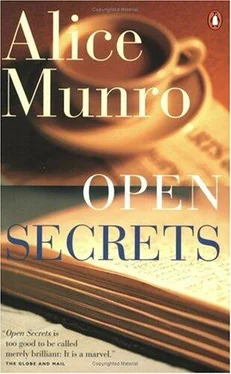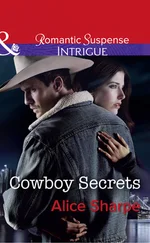Alice Munro - Open Secrets
Здесь есть возможность читать онлайн «Alice Munro - Open Secrets» весь текст электронной книги совершенно бесплатно (целиком полную версию без сокращений). В некоторых случаях можно слушать аудио, скачать через торрент в формате fb2 и присутствует краткое содержание. Год выпуска: 1994, ISBN: 1994, Издательство: McClelland & Stewart, Жанр: Проза, на английском языке. Описание произведения, (предисловие) а так же отзывы посетителей доступны на портале библиотеки ЛибКат.
- Название:Open Secrets
- Автор:
- Издательство:McClelland & Stewart
- Жанр:
- Год:1994
- ISBN:978-1-55199-396-6
- Рейтинг книги:5 / 5. Голосов: 1
-
Избранное:Добавить в избранное
- Отзывы:
-
Ваша оценка:
- 100
- 1
- 2
- 3
- 4
- 5
Open Secrets: краткое содержание, описание и аннотация
Предлагаем к чтению аннотацию, описание, краткое содержание или предисловие (зависит от того, что написал сам автор книги «Open Secrets»). Если вы не нашли необходимую информацию о книге — напишите в комментариях, мы постараемся отыскать её.
Open Secrets — читать онлайн бесплатно полную книгу (весь текст) целиком
Ниже представлен текст книги, разбитый по страницам. Система сохранения места последней прочитанной страницы, позволяет с удобством читать онлайн бесплатно книгу «Open Secrets», без необходимости каждый раз заново искать на чём Вы остановились. Поставьте закладку, и сможете в любой момент перейти на страницу, на которой закончили чтение.
Интервал:
Закладка:
The coincidence of the name was hardly even interesting. Neither the first name nor the last was all that unusual.
She did not know why she had sat down, or why she had come over here in the first place. She was beginning to feel a faintly sickening, familiar agitation. She could feel that over nothing. But once it got going, telling herself that it was over nothing did no good. The only thing to do was to get up and get away from here before any more people sat down and hemmed her in.
The green woman intercepted her, asked if she was all right.
“I have to catch a bus,” said Louisa in a croaky voice. She cleared her throat. “An out-of-town bus,” she said with better control, and marched away, not in the right direction for Simpsons. She thought in fact that she wouldn’t go there, she wouldn’t go to Birks for the wedding present or to a movie either. She would just go and sit in the bus depot until it was time for her to go home.
Within half a block of the bus depot she remembered that the bus had not taken her there that morning. The depot was being torn down and rebuilt — there was a temporary depot several blocks away. She had not paid quite enough attention to which street it was on — York Street, east of the real depot, or King? At any rate, she had to detour, because both of these streets were being torn up, and she had almost decided she was lost when she realized she had been lucky enough to come upon the temporary depot by the back way. It was an old house — one of those tall yellow-gray brick houses dating from the time when this was a residential district. This was probably the last use it would be put to before being torn down. Houses all around it must have been torn down to make the large gravelled lot where the buses pulled in. There were still some trees at the edge of the lot and under them a few rows of chairs that she had not noticed when she got off the bus before noon. Two men were sitting on what used to be the veranda of the house, on old car seats. They wore brown shirts with the bus company’s insignia but they seemed to be halfhearted about their work, not getting up when she asked if the bus to Carstairs was leaving at six o’clock as scheduled and where could she get a soft drink?
Six o’clock, far as they knew.
Coffee shop down the street.
Cooler inside but only Coke and orange left.
She got herself a Coca-Cola out of the cooler in a dirty little indoor waiting room that smelled of a bad toilet. Moving the depot to this dilapidated house must have thrown everyone into a state of indolence and fecklessness. There was a fan in the room they used as an office, and she saw, as she went by, some papers blow off the desk. “Oh, shit,” said the office girl, and stamped her heel on them.
The chairs set up in the shade of the dusty city trees were straight-backed old wooden chairs originally painted different colors — they looked as if they had come from various kitchens. Strips of old carpet and rubber bathroom mats were laid down in front of them, to keep your feet off the gravel. Behind the first row of chairs she thought she saw a sheep lying on the ground, but it turned into a dirty-white dog, which trotted over and looked at her for a moment in a grave semiofficial way — gave a brief sniff at her shoes, and trotted away. She had not noticed if there were any drinking straws and did not feel like going back to look. She drank Coke from the bottle, tilting back her head and closing her eyes.
When she opened them, a man was sitting one chair away, and was speaking to her.
“I got here as soon as I could,” he said. “Nancy said you were going to catch a bus. As soon as I finished with the speech, I took off. But the bus depot is all torn up.”
“Temporarily,” she said.
“I knew you right away,” he said. “In spite of — well, many years. When I saw you, I was talking to somebody. Then I looked again and you’d disappeared.”
“I don’t recognize you,” said Louisa.
“Well, no,” he said. “I guess not. Of course. You wouldn’t.”
He was wearing tan slacks, a pale-yellow short-sleeved shirt, a cream-and-yellow ascot scarf. A bit of a dandy, for a union man. His hair was white but thick and wavy, the sort of springy hair that goes in ripples, up and back from the forehead, his skin was flushed and his face was deeply wrinkled from the efforts of speechmaking — and from talking to people privately, she supposed, with much of the fervor and persuasiveness of his public speeches. He wore tinted glasses, which he took off now, as if willing that she should see him better. His eyes were a light blue, slightly bloodshot and apprehensive. A good-looking man, still trim except for a little authoritative bulge over the belt, but she did not find these serviceable good looks — the careful sporty clothes, the display of ripply hair, the effective expressions — very attractive. She preferred the kind of looks Arthur had. The restraint, the dark-suited dignity that some people could call pompous, that seemed to her admirable and innocent.
“I always meant to break the ice,” he said. “I meant to speak to you. I should have gone in and said goodbye at least. The opportunity to leave came up so suddenly.”
Louisa did not have any idea what to say to this. He sighed. He said, “You must have been mad at me. Are you still?”
“No,” she said, and fell back, ridiculously, on the usual courtesies. “How is Grace? How is your daughter? Lillian?”
“Grace is not so well. She had some arthritis. Her weight doesn’t help it. Lillian is all right. She’s married but she still teaches high school. Mathematics. Not too usual for a woman.”
How could Louisa begin to correct him? Could she say, No, your wife Grace got married again during the war, she married a farmer, a widower. Before that she used to come in and clean our house once a week. Mrs. Feare had got too old. And Lillian never finished high school, how could she be a high-school teacher? She married young, she had some children, she works in the drugstore. She had your height and your hair, dyed blond. I often looked at her and thought she must be like you. When she was growing up, I used to give her my stepdaughter’s outgrown clothes.
Instead of this, she said, “Then the woman in the green dress — that was not Lillian?”
“Nancy? Oh, no! Nancy is my guardian angel. She keeps track of where I’m going, and when, and have I got my speech, and what I drink and eat and have I taken my pills. I tend toward high blood pressure. Nothing too serious. But my way of life’s no good. I’m on the go constantly. Tonight I’ve got to fly out of here to Ottawa, tomorrow I’ve got a tough meeting, tomorrow night I’ve got some fool banquet.”
Louisa felt it necessary to say, “You knew that I got married? I married Arthur Doud.”
She thought he showed some surprise. But he said, “Yes, I heard that. Yes.”
“We worked hard, too,” said Louisa sturdily. “Arthur died six years ago. We kept the factory going all through the thirties even though at times we were down to three men. We had no money for repairs and I remember cutting up the office awnings so that Arthur could carry them up on a ladder and patch the roof. We tried making everything we could think of. Even outdoor bowling alleys for those amusement places. Then the war came and we couldn’t keep up. We could sell all the pianos we could make but also we were making radar cases for the Navy. I stayed in the office all through.”
“It must have been a change,” he said, in what seemed a tactful voice. “A change from the Library.”
“Work is work,” she said. “I still work. My stepdaughter Bea is divorced, she keeps house for me after a fashion. My son has finally finished university — he is supposed to be learning about the business, but he has some excuse to go off in the middle of every afternoon. When I come home at suppertime, I am so tired I could drop, and I hear the ice tinkling in their glasses and them laughing behind the hedge. Oh, Mud, they say when they see me, Oh, poor Mud, sit down here, get her a drink! They call me Mud because that was my son’s name for me when he was a baby. But they are neither of them babies now. The house is cool when I come home — it’s a lovely house if you remember, built in three tiers like a wedding cake. Mosaic tiles in the entrance hall. But I am always thinking about the factory, that is what fills my mind. What should we do to stay afloat? There are only five factories in Canada making pianos now, and three of them are in Quebec with the low cost of labor. No doubt you know all about that. When I talk to Arthur in my head, it is always about the same thing. I am very close to him still but it is hardly in a mystical way. You would think as you get older your mind would fill up with what they call the spiritual side of things, but mine just seems to get more and more practical, trying to get something settled. What a thing to talk to a dead man about.”
Читать дальшеИнтервал:
Закладка:
Похожие книги на «Open Secrets»
Представляем Вашему вниманию похожие книги на «Open Secrets» списком для выбора. Мы отобрали схожую по названию и смыслу литературу в надежде предоставить читателям больше вариантов отыскать новые, интересные, ещё непрочитанные произведения.
Обсуждение, отзывы о книге «Open Secrets» и просто собственные мнения читателей. Оставьте ваши комментарии, напишите, что Вы думаете о произведении, его смысле или главных героях. Укажите что конкретно понравилось, а что нет, и почему Вы так считаете.












